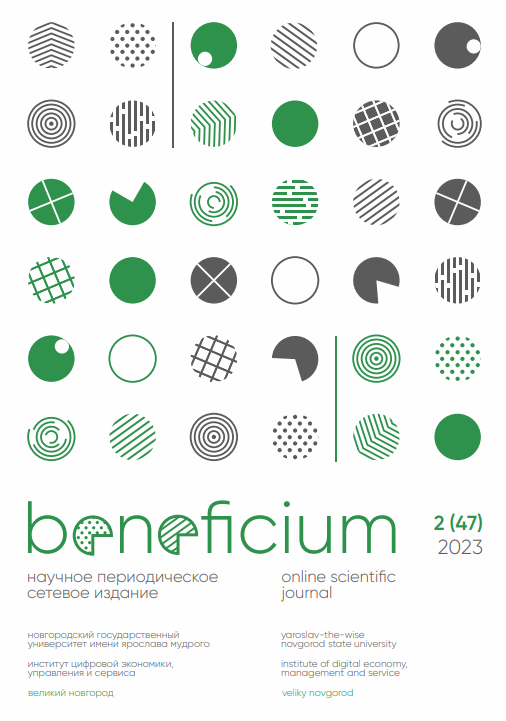REGIONAL AND MUNICIPAL INTERACTION IN THE SPHERE OF USING DIGITAL PUBLIC MANAGEMENT TOOLS
Abstract
The processes of digital transformation, which are becoming increasingly important in the global economy, are now increasingly active in such spheres as public administration, which are not directly related to production activities. During the first decade of the XXI century, the digitalization of the Russian public administration system primarily consisted in the formation of a number of federal information systems, but by the end of the second decade, the regional level began to show increasing dynamics of implementation of digital tools. In the framework of the regional digital transformation, the main difference from the federal one is the presence at the grassroots level of a number of autonomous municipal organizations that are not subordinate to the regional center and in some cases have their own vision of this process. Under such conditions, municipal-regional interaction in the field of digital tools of public administration acquires great importance. However, this process is characterized by a low level of formalization and can look like a set of unrelated functional processes, which leads to the lack of comprehensive research in this area. At the same time, the process of regional-municipal interaction, according to the hypothesis of this study, is a complex of interrelated elements based on economic factors, the violation in the practical implementation of each of which contributes to the formation of prerequisites for the inefficient use of digital tools. Thus, the purpose of this study is to analyze the structure and composition of the regional-municipal interaction in the framework of the use of digital tools of public administration. On the basis of the goal, the study defined a number of tasks, including the definition of the essence of this interaction, identifying its structure and composition. The study was based on the normative legal acts of public authorities, official digital publications of state and municipal organizations, scientific publications on the digitalization of public administration. According to the results of the study, the basic elements of interaction, their interrelations, and the associated potential risks of disruption of the effective use of digital tools were identified.
Keywords: innovation, information technology, local government, regional government, digital technology
References
- Beldyugin P.S. Efficiency of introduction of information technologies in the management system on the case of Moscow// Economics: Yesterday, Today and Tomorrow. 2020. Vol. 10(1A). Pp. 346-351. (In Russ.). DOI: 10.34670/2020.91.1.038
- Kokhanovskaya I.I. Ispolʹzovanie informacionno-kommunikacionnyh tehnologij v celjah povyšenija èffektivnosti mestnogo samoupravlenija [The use of information and communication technologies to improve the efficiency of local government] / Russia: Trends and Prospects for Development: Yearbook, Moscow, December 20-21, 2018. Issue 14. Part 1. Moscow: Institute of Scientific Information on Social Sciences RAS, 2019. Pp. 816-820. (In Russ.).
- Bamburov V.A. The application of artificial intelligence technology in corporate governance // Public Administration. 2018. Vol. 20(3-113). Pp. 23-28. (In Russ.). DOI: 10.22394/2070-8378-2018-20-3-23-28
- Dobrolyubova E.I., Yuzhakov V.N., Efremov A.A. Tsifrovoe budushchee gosudarstvennogo upravlenija po rezul'tatam [Digital Future of Public Administration by Results]. М.: “Delo” RANEPA, 2019. 114 p. (In Russ.).
- Abramov R.N. Soviet technocratic mythologies myth as the form of lost chance theory: on the case of the history of the cybernetics in the USSR // Sociology of Science and Technology. 2017. Vol. 8(2). Pp. 61-78. (In Russ.).
- Safronov A.V. Bureaucratic and technological limitations of computerization of planning in the USSR // Economic Policy. 2022. Vol. 17(2). Pp. 20-41. (In Russ.). DOI: 10.18288/1994-5124-2022-2-120-145
- Aleshnikova V.I. Digital communications in the marketing areas // Proceedings of Voronezh State University. Series: Economics and Management. 2018. Vol. 3. Pp. 142-146. (In Russ.).
- Mutigullin A.S., Prasolova E.A. Review of methodologies of development of corporate information systems // Scientific Review. Technical Science. Vol. 6. Pp. 41-45. (In Russ.).
- Lapina T.I., Kriushin E.A. Konvertatsii fajlov dannykh SUBD s ispol'zovaniem veb-interfejsov [Converting DBMS data files using web interfaces] / Intellektual'nye informatsionnye sistemy: tendentsii, problemy, perspektivy [Intelligent information systems: trends, problems, prospects]: Proceedings of VI All-Russian full-time scientific and practical conference "IIS-2018"], Kursk, November 23, 2018. Kursk: “University Book”, 2018. Pp. 88-92. (In Russ.).
- State Budgetary Educational Institution of Additional Professional Education "Moscow Regional Training Center". Information about receipts to the budget of the institution (2023). Official site for publishing information about state (municipal) institutions. (In Russ.). URL: https://bus.gov.ru/info-card/357717 (accessed on 05.05.2023).
- Register of information systems of the Moscow region (2023). The Ministry of Public Administration, Information Technologies and Communications of the Moscow Region. (In Russ.). URL: https://mits.mosreg.ru/dokumenty/ministerstvo/vzaimodeystvie-ministerstva/informacionnye-sistemy-moskovskoy-oblasti/02-05-2023-16-39-34-zamenit-fayl-v-reestr-informatsionnykh-sistem-mosk (accessed on 03.05.2023).
About the Author
Maksim A. Sidorov – External Doctoral Candidate, Russian University of Cooperation, Mytishchi, Moscow Region, Russia. E-mail: makc.cidorov@yandex.ru. SPIN РИНЦ 1355-4403. ORCID 0000-0002-8790-885X
For citation: Sidorov M.A. Regional and Municipal Interaction in the Sphere of Using Digital Public Management Tools // BENEFICIUM. 2023. Vol. 2(47). Pp. 62-68. (In Russ.). DOI: 10.34680/BENEFICIUM.2023.2(47).62-68









